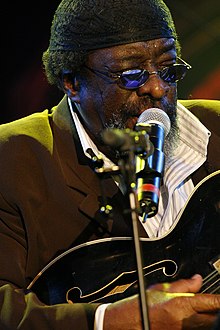James "Blood" Ulmer (born February 2, 1942) is an American jazz and blues guitarist and singer. Ulmer's distinctive guitar sound has been described as "jagged" and "stinging." His singing has been called "raggedly soulful". Ulmer was born in St. Matthews, South Carolina. He began his career playing with various soul jazz ensembles, first in Pittsburgh, Pennsylvania, from 1959-1964, and then in the Columbus, Ohio region, from 1964-1967. He first recorded with organist John Patton in 1969. After moving to New York in 1971, Ulmer played with Art Blakey's Jazz Messengers, Joe Henderson, Paul Bley, Rashied Ali and Larry Young.
In the early 1970s, Ulmer joined Ornette Coleman; he was the first electric guitarist to record and tour extensively with Coleman. He has credited Coleman as a major influence, and Coleman's strong reliance on electric guitar in his fusion-oriented recordings owes a distinct debt to Ulmer.1983's Odyssey, with drummer Warren Benbow and violinist Charles Burnham, was described as "avant-gutbucket," leading writer Bill Milkowski to describe the music as "conjuring images of Skip James and Albert Ayler jamming on the Mississippi Delta."
Ulmer has recorded many albums as a leader, including three recent acclaimed blues-oriented records produced by Vernon Reid. He also performs solo.Ulmer was also a judge for the 8th annual Independent Music Awards to support independent artists.
In a 2005 Down Beat interview, Ulmer opined that guitar technique had not advanced since the death of Jimi Hendrix.[4] He stated that technique could advance "if the guitar would stop following the piano," and indicated that he tunes all of his guitar strings to "A". Fast forward to December 2006. James Blood Ulmer is gathered with "The Memphis Blood Blues Band" at Piety Street Studios in New Orleans. The seven-piece unit, who were named after the Grammy Award-nominated album Memphis Blood: The Sun Sessions which they recorded in 2001, features Vernon Reid on guitar, Charlie Burnham on fiddle, David Barnes on harmonica, Leon Gruenbaum on various keyboards, Mark Peterson on bass and Aubrey Dayle on drums. This is the third album they're recording together as a band and the follow-up to the critically-acclaimed No Escape From the Blues: The Electric Lady Sessions released in 2003. As a group, they're razor sharp from several tours of Europe over the past year.
Ulmer alternately growls out direction as to the songs' arrangements and shouts his encouragement as they take form. He possesses a singular vision for the music that's shaped by his childhood playing gospel in the Baptist church, his early 20's working the Midwest juke-joint circuit with artists like Hank Marr and his later years on the avant-jazz scene immersed in Ornette Coleman's harmolodic theory. Ironically, blues as a pre-determined style of music means little if anything to Ulmer. But the "concept of the blues" is a whole other thing entirely. A lyric from Ulmer's "There Is Power In The Blues" might best set the tone: "Let's put the color back in the blues, way down here in New Orleans, let's start over just one more time, use the concept of the blues to feel our way around."
In the early 1970s, Ulmer joined Ornette Coleman; he was the first electric guitarist to record and tour extensively with Coleman. He has credited Coleman as a major influence, and Coleman's strong reliance on electric guitar in his fusion-oriented recordings owes a distinct debt to Ulmer.1983's Odyssey, with drummer Warren Benbow and violinist Charles Burnham, was described as "avant-gutbucket," leading writer Bill Milkowski to describe the music as "conjuring images of Skip James and Albert Ayler jamming on the Mississippi Delta."
Ulmer has recorded many albums as a leader, including three recent acclaimed blues-oriented records produced by Vernon Reid. He also performs solo.Ulmer was also a judge for the 8th annual Independent Music Awards to support independent artists.
In a 2005 Down Beat interview, Ulmer opined that guitar technique had not advanced since the death of Jimi Hendrix.[4] He stated that technique could advance "if the guitar would stop following the piano," and indicated that he tunes all of his guitar strings to "A". Fast forward to December 2006. James Blood Ulmer is gathered with "The Memphis Blood Blues Band" at Piety Street Studios in New Orleans. The seven-piece unit, who were named after the Grammy Award-nominated album Memphis Blood: The Sun Sessions which they recorded in 2001, features Vernon Reid on guitar, Charlie Burnham on fiddle, David Barnes on harmonica, Leon Gruenbaum on various keyboards, Mark Peterson on bass and Aubrey Dayle on drums. This is the third album they're recording together as a band and the follow-up to the critically-acclaimed No Escape From the Blues: The Electric Lady Sessions released in 2003. As a group, they're razor sharp from several tours of Europe over the past year.
Ulmer alternately growls out direction as to the songs' arrangements and shouts his encouragement as they take form. He possesses a singular vision for the music that's shaped by his childhood playing gospel in the Baptist church, his early 20's working the Midwest juke-joint circuit with artists like Hank Marr and his later years on the avant-jazz scene immersed in Ornette Coleman's harmolodic theory. Ironically, blues as a pre-determined style of music means little if anything to Ulmer. But the "concept of the blues" is a whole other thing entirely. A lyric from Ulmer's "There Is Power In The Blues" might best set the tone: "Let's put the color back in the blues, way down here in New Orleans, let's start over just one more time, use the concept of the blues to feel our way around."

No comments:
Post a Comment